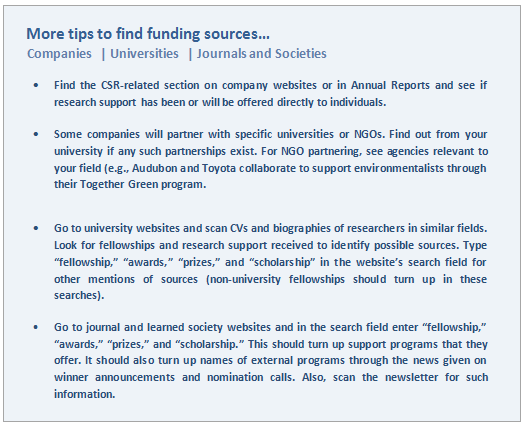Why will corporations fund your research?

In my previous posts, I discussed governmental and nongovernmental agencies as research funders. Today, I cover another type of support that is worth considering: corporate research funding. More corporations are becoming proactive with funding initiatives as they add two more lines—in addition to loss/profit to their business accounting—social and environmental concerns. This concept of the triple bottom line results in companies supporting initiatives that create social value such as research. For instance, Olympus, a technology company, offers the two-year Fellows Program for those interested in pursuing a career in the health care or consumer electronics industry. Couple of others that offer fellowships are Intel and Mizuho-DL Financial Technology Co., Ltd.
First, it is crucial you understand the different reasons for why corporations are interested in providing such support. Such clarity will help you assess whether it is a suitable arrangement for you and define an angle for your proposal.
Here are reasons why corporations are interested in funding your research:
- Research funding can be considered as corporate social responsibility (CSR). CSR activities can lead to a positive public image for those companies that have socially conscious investors or clients. In fact, some investors, specifically those who take into consideration Environment, Social, and Governance (ESG) issues, firmly believe that a company that has strong CSR initiatives will deliver better returns in the long-term.
- Research funding may fulfill a governmental CSR requirement. For instance, in India, the Companies Act requires companies falling within certain categories to spend at least 2% of their profits toward CSR activities. Companies do not have to spend it on research funding but it is an option for them.
- The knowledge gained from research may be useful to the company’s progress, as it can potentially contribute to its R&D efforts.
Make sure to learn the reason for a company’s interest in research funding to develop your proposal’s approach. An effective approach will be one that integrates your research activities with the company’s key interests. For instance, if the company is looking to create a positive image with their investors and clients, then you should emphasize the social or environmental value your research is capable of creating. The company will be seen, by current and potential stakeholders, as not only the supporter but also the enabler and producer of whatever value your research creates. This is an angle that can benefit the company in attracting or retaining their clients and investors. If the company's reason for research support is in hopes of new knowledge to improve a company's product or develop a new one, you will want to explain how your research could be successful in this way. In this scenario, stakeholders will be keen on any prospects that cater to their specific interest in the company, which could range from largely financial (e.g. owners, shareholders, etc.) to social consciousness (e.g. regulatory bodies, communities, etc.)
Bear in mind that while corporations are a lucrative source, particularly for scientific fields, the funding may be limited by stipulations on what is to be researched and the end goal. Give thought to the ethical issues pertaining to conflict-of-interest. For instance, will your research turn up results that puts the company’s products or practices in a negative light? On what aspects of your study, if any, can you afford to have the company to weigh in? Additionally, journals will require authors to include a statement concerning financial competing interests when submitting their paper. If you still find your research productivity aligns with the company’s interests and the funding arrangement will not bring into question the ethics of your research practice, corporate funding may be a viable option. For many companies, CSR plans are a new initiative that is still being implemented or developed. Even if a funding program is not in place, it may be worthwhile to contact the person handling such initiatives to explore whether the company is open to expanding their CSR initiatives in this way. Contact the company’s investor relations, CSR, or sustainability divisions as each company will have a different organizational setup to handle such programs.

The following post provides you useful tips to make your grant proposal persuasive: Writing an effective research grant proposal.
Published on: Feb 14, 2014
Comments
You're looking to give wings to your academic career and publication journey. We like that!
Why don't we give you complete access! Create a free account and get unlimited access to all resources & a vibrant researcher community.

Subscribe to Career Growth












